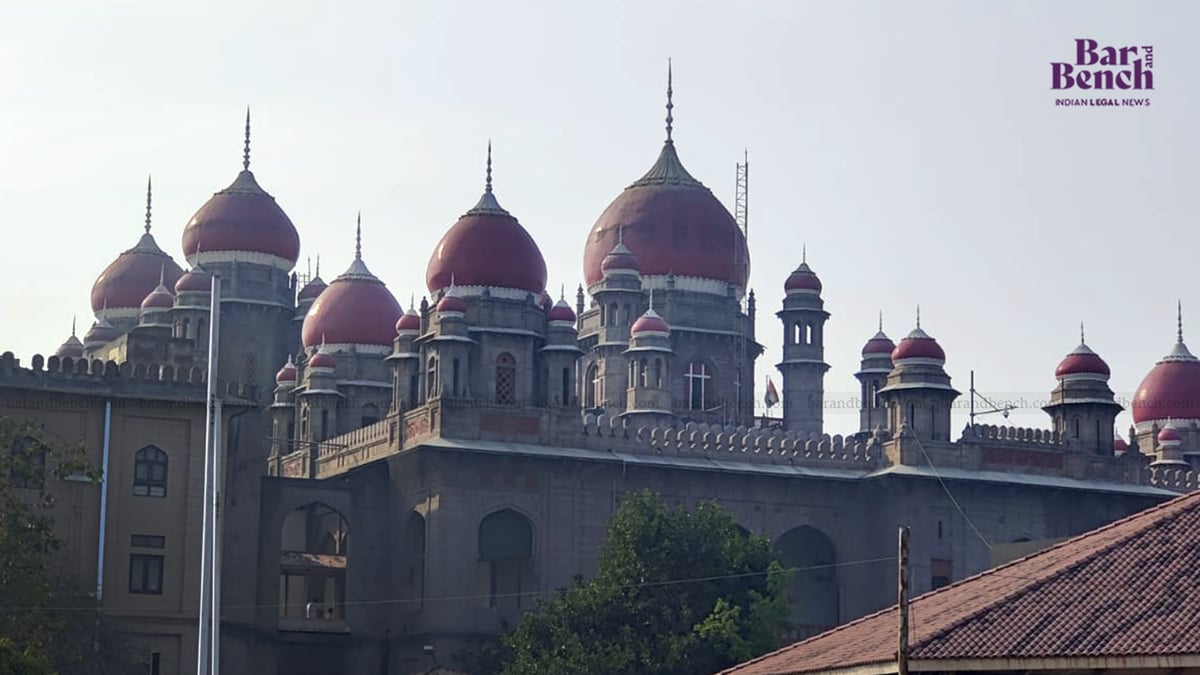


A division bench of the Telangana High Court has formed a committee to review disqualification petitions filed against three Bharat Rashtra Samithi (BRS) leaders who defected to the Congress. The High Court has also declined to stay a single-judge order warning the State assembly speaker of further court proceedings if he does not decide on the petitions. The case raises the question of whether the High Court can order a speaker to decide on disqualification petitions within a fixed time frame.
High Court of Telangana Intervenes in Disqualification Petitions Against BRS Defectors
The High Court of Telangana has taken center stage in a crucial legal battle involving disqualification petitions filed against three Bharat Rashtra Samithi (BRS) leaders who defected to the Congress party. This case has sparked questions about the High Court's authority to intervene in such matters.
Background:
The three BRS leaders in question, Komatireddy Rajagopal Reddy, Revanth Reddy, and S.A. Sampath Kumar, resigned from their respective positions in the Telangana Legislative Assembly and joined the Congress in September 2021. Subsequently, disqualification petitions were filed against them by BRS leaders.
High Court's Intervention:
In February 2023, a division bench of the Telangana High Court constituted a committee to review the disqualification petitions and report its findings to the court. The bench also declined to grant a stay on a single-judge order that had warned the State assembly speaker against delaying his decision on the petitions.
The High Court's decision raises a fundamental question of whether it can direct a speaker to decide on disqualification petitions within a specified time frame. The speaker's authority in such matters is typically protected by the Constitution.
Top 5 FAQs and Answers:
Q1: What is the legal basis for disqualification petitions? A1: Under the Tenth Schedule of the Constitution, known as the Anti-Defection Law, elected representatives can be disqualified from holding their positions if they voluntarily give up membership of the political party on whose ticket they were elected.
Q2: Why is the High Court intervening in this case? A2: The High Court has intervened because the petitioners have alleged that the speaker is deliberately delaying his decision on the disqualification petitions. They argue that this undue delay is preventing them from participating in legislative proceedings.
Q3: What is the committee formed by the High Court expected to do? A3: The committee is tasked with reviewing the disqualification petitions, examining relevant evidence, and submitting its findings to the High Court.
Q4: What if the speaker does not decide on the petitions within the time frame? A4: The High Court has warned the speaker that further court proceedings could be initiated if he fails to act promptly. The High Court may ultimately order the speaker to decide on the petitions within a specified time frame.
Q5: How does this case impact the principle of separation of powers? A5: The intervention of the High Court in this case raises questions about the balance of power between the judiciary and the legislature. The speaker's decision-making authority is generally considered to be protected by the doctrine of separation of powers. However, the High Court's actions suggest that it may be willing to assert its authority in certain circumstances.

During a public meeting in Bihar, Union Home Minister Amit Shah dismissed any speculation about leadership changes by firmly stating that there is "no seat vacant" in politics. Praising Chief Minister Nitish Kumar and Prime Minister Narendra Modi, Shah urged the people of Bihar to vote for the NDA in the upcoming assembly elections. He also addressed various issues such as the construction of the Ram Temple and the ban on PFI, while emphasizing the NDA's strong leadership in the state.

Union Home Minister Amit Shah expressed his confidence that the BJP will emerge victorious in the upcoming assembly elections in West Bengal. He also criticized Chief Minister Mamata Banerjee and the ruling TMC for their opposition towards the special revision exercise for the voter list. The minister defended the legitimacy of the process and supported the Election Commission, while the opposition claims it is a ploy to manipulate voter lists before the polls.

Union Home Minister Amit Shah criticised the opposition's manifesto promise of providing government jobs in Bihar if they come into power. Calling it "nonsensical", Shah stated that such a promise is absurd and the opposition knows they will never come to power and will not have to fulfil any promises made. He also pointed out that the opposition's manifesto ignores the development strides made in Bihar, such as electricity and clean water reaching every village.

In an exclusive interview with News18 India, Union Home Minister Amit Shah dismissed Rahul Gandhi's allegations of "vote chori" (vote theft) and assured the people of Bihar that the BJP will take action against every single infiltrator in the country. He also addressed concerns about Nitish Kumar's health and stated that the Bihar CM was holding four rallies a day, proving that there was no question of his health being in poor shape. Additionally, Shah criticized the opposition's attempt to create a negative perception about Nitish Kumar.

In a recent interview with News18 India's "Sabse Bada Dangal Bihar 2025", Union Home Minister Amit Shah confidently stated that the NDA will form a government with an unprecedented two-thirds majority in the upcoming Bihar assembly elections. Shah also vehemently denied any concerns raised by the opposition regarding the health of Chief Minister Nitish Kumar, stating that both he and Kumar are holding four rallies a day. This marks a major shift in the political equation in Bihar, as the BJP and JD(U) are contesting an equal number of seats, a first in the state's electoral history.

PM Modi delivered a speech at the Maritime Leaders' Conclave in Mumbai, praising the government's efforts in revolutionizing and modernizing the country's shipping sector. He emphasized the nation's ports as being among the most efficient in the developing world, declaring that India has made significant progress in this area.

Union Minister Dharmendra Pradhan, who is also the BJP's in-charge for the Bihar polls, has strongly criticized Congress leader Rahul Gandhi for his derogatory comments against PM Modi. Pradhan has demanded a public apology from Gandhi for his remarks, stating that they are against basic norms of public discourse. He further added that this reflects the Congress' deep-rooted resentment and frustration towards PM Modi and his leadership. Meanwhile, Rahul Gandhi has kicked off his poll campaign in Bihar with a scathing attack on PM Modi, accusing him of "enacting all types of drama" for votes and running the state through remote control.

Elon Musk's xAI has launched Grokipedia, an AI-powered online encyclopedia to rival Wikipedia. Musk aims for the platform to be a "massive improvement" and free from any political bias. While Grokipedia currently sources content from Wikipedia, Musk plans to have all original content by the end of the year. This development adds to Bihar's political landscape, where leaders like Lalu Prasad and Nitish Kumar have dominated with their OBC politics, while Nitish's developmental narrative has transformed the state's political landscape.

BJP leader Chandrashekhar Bawankule sparked controversy with his statement that party workers' phones and WhatsApp groups are being monitored ahead of local body elections. Shiv Sena leader Sanjay Raut demanded his arrest, alleging that the phones of several Opposition leaders were also tapped. Bawankule clarified his statement, but the Sena leader questioned the involvement of BJP offices and technology networks, calling it a potentially anti-national act.

The Election Commission (EC) has announced the schedule for Special Summary Revision (SIR) of electoral rolls in 12 states and Union Territories (UTs) for the year 2025, excluding Assam due to the ongoing National Register of Citizens (NRC) process. While the BJP has welcomed the announcement, the Congress has raised concerns and questioned the decision. The Chief Election Commissioner (CEC) has stated that Assam has a separate provision in citizenship laws and the NRC process must be taken into consideration, causing potential delays in the SIR preparations. Despite the physical closure of banks in Ranchi and Patna, financial services will remain available through digital and self-service platforms, so customers are advised to use online banking and plan any in-branch visits accordingly.